Ethics and Governance: Analysis of Royal Commission on Finance
VerifiedAdded on 2023/02/01
|12
|3061
|63
Report
AI Summary
This report analyzes the Royal Commission's findings on the conduct of financial service entities, highlighting instances of misconduct, particularly within Freedom Insurance. It explores the application of deontological ethics to the observed unethical practices, such as aggressive sales tactics and failures in quality assurance. The report details the Freedom case study, including the sale of insurance products to vulnerable customers, issues with quality assurance, and problematic remuneration practices. It examines violations of the Corporations Act and ASIC Act, emphasizing the failure to prioritize consumer interests and ethical standards. The analysis reveals a breakdown in ethical governance, with a focus on how the financial service providers failed to meet the standards and expectations of the community and the impact of these practices on consumers.
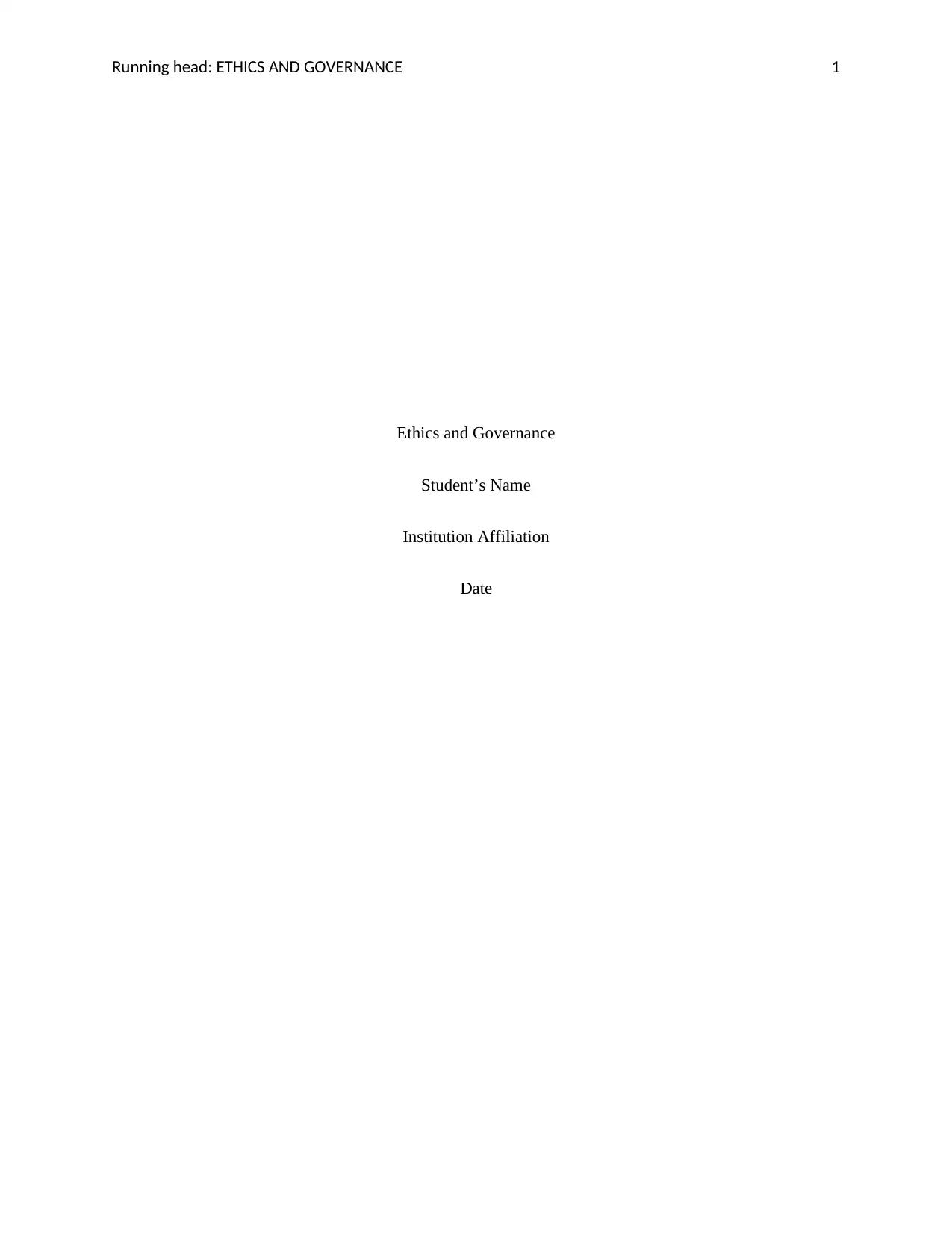
Running head: ETHICS AND GOVERNANCE 1
Ethics and Governance
Student’s Name
Institution Affiliation
Date
Ethics and Governance
Student’s Name
Institution Affiliation
Date
Paraphrase This Document
Need a fresh take? Get an instant paraphrase of this document with our AI Paraphraser
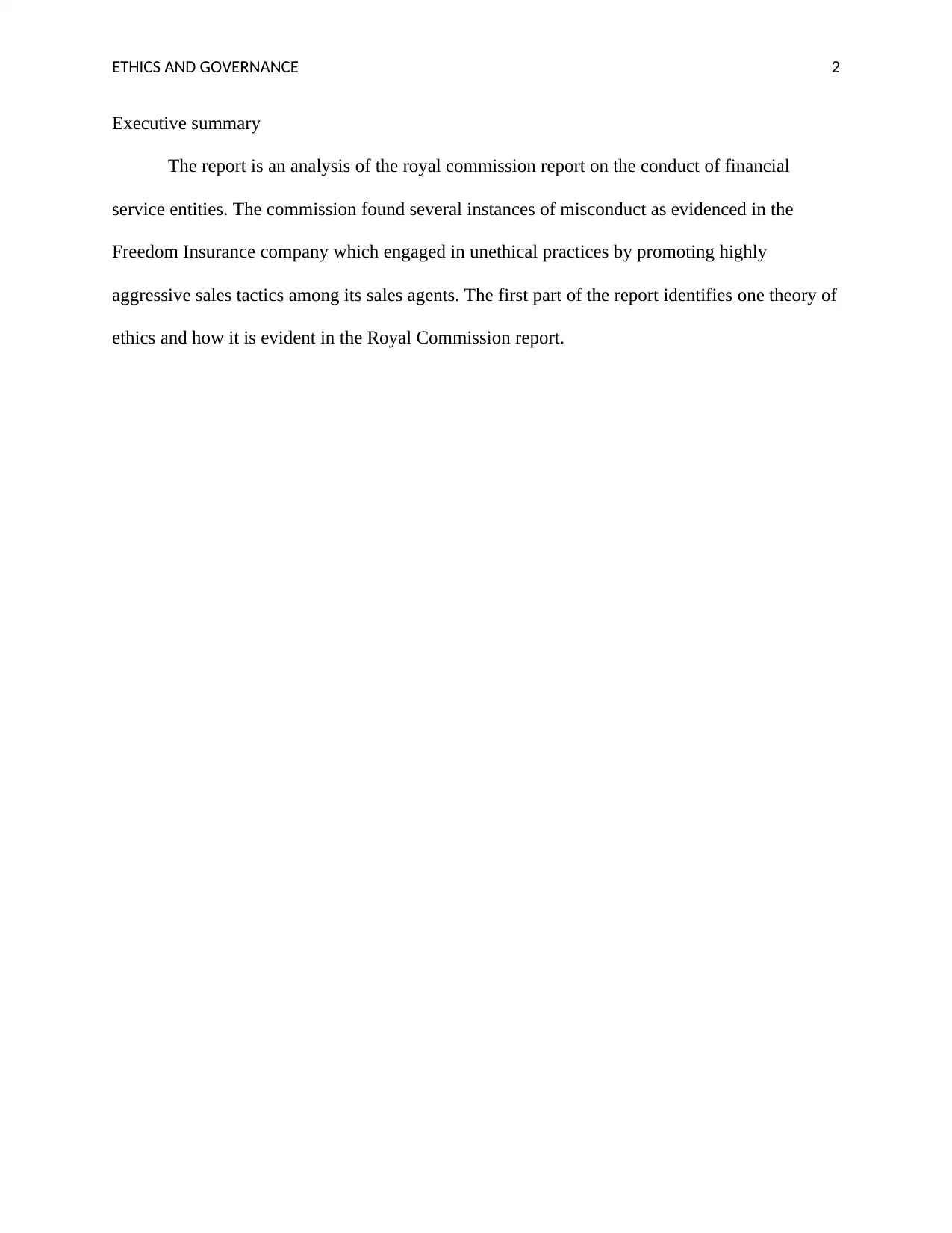
ETHICS AND GOVERNANCE 2
Executive summary
The report is an analysis of the royal commission report on the conduct of financial
service entities. The commission found several instances of misconduct as evidenced in the
Freedom Insurance company which engaged in unethical practices by promoting highly
aggressive sales tactics among its sales agents. The first part of the report identifies one theory of
ethics and how it is evident in the Royal Commission report.
Executive summary
The report is an analysis of the royal commission report on the conduct of financial
service entities. The commission found several instances of misconduct as evidenced in the
Freedom Insurance company which engaged in unethical practices by promoting highly
aggressive sales tactics among its sales agents. The first part of the report identifies one theory of
ethics and how it is evident in the Royal Commission report.
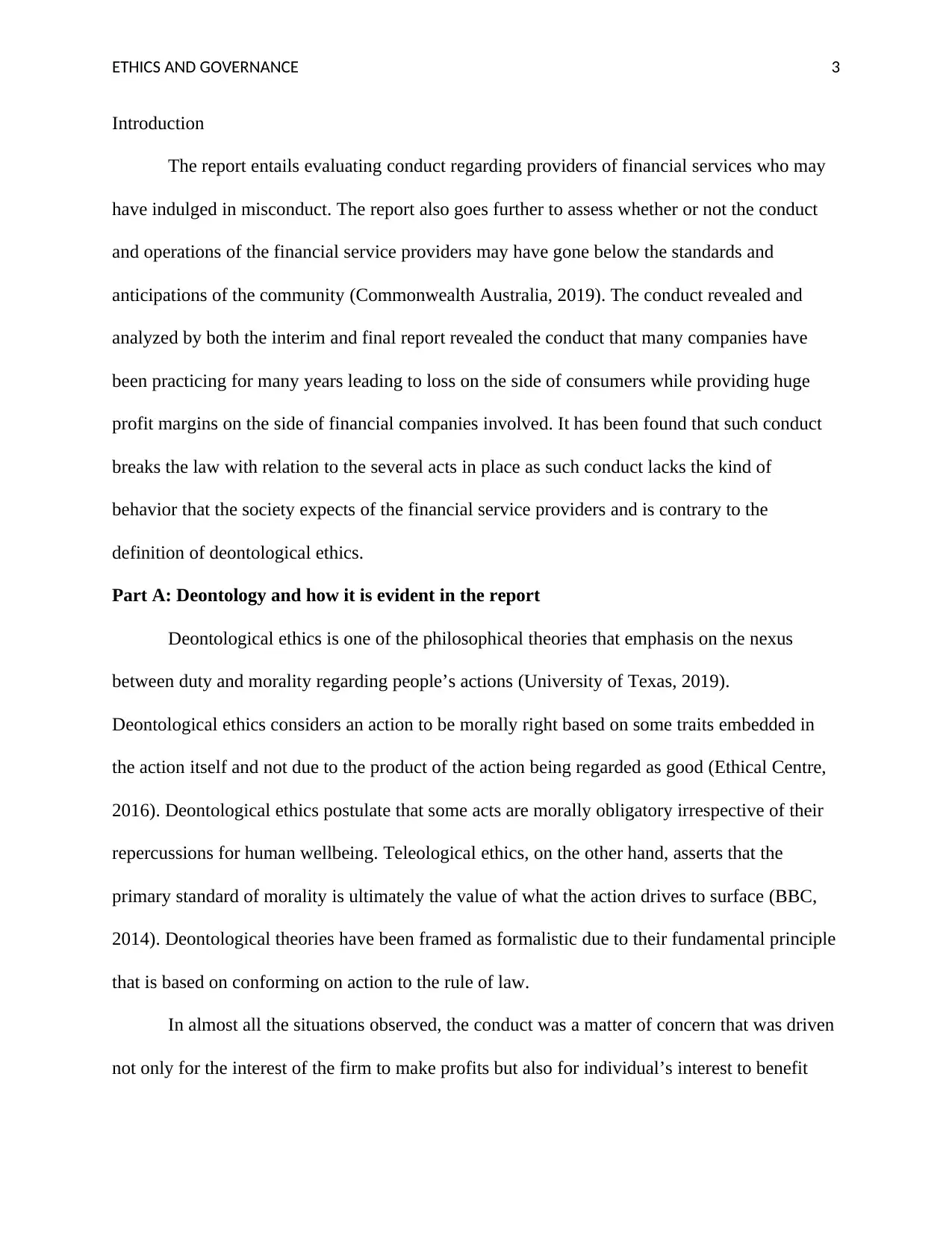
ETHICS AND GOVERNANCE 3
Introduction
The report entails evaluating conduct regarding providers of financial services who may
have indulged in misconduct. The report also goes further to assess whether or not the conduct
and operations of the financial service providers may have gone below the standards and
anticipations of the community (Commonwealth Australia, 2019). The conduct revealed and
analyzed by both the interim and final report revealed the conduct that many companies have
been practicing for many years leading to loss on the side of consumers while providing huge
profit margins on the side of financial companies involved. It has been found that such conduct
breaks the law with relation to the several acts in place as such conduct lacks the kind of
behavior that the society expects of the financial service providers and is contrary to the
definition of deontological ethics.
Part A: Deontology and how it is evident in the report
Deontological ethics is one of the philosophical theories that emphasis on the nexus
between duty and morality regarding people’s actions (University of Texas, 2019).
Deontological ethics considers an action to be morally right based on some traits embedded in
the action itself and not due to the product of the action being regarded as good (Ethical Centre,
2016). Deontological ethics postulate that some acts are morally obligatory irrespective of their
repercussions for human wellbeing. Teleological ethics, on the other hand, asserts that the
primary standard of morality is ultimately the value of what the action drives to surface (BBC,
2014). Deontological theories have been framed as formalistic due to their fundamental principle
that is based on conforming on action to the rule of law.
In almost all the situations observed, the conduct was a matter of concern that was driven
not only for the interest of the firm to make profits but also for individual’s interest to benefit
Introduction
The report entails evaluating conduct regarding providers of financial services who may
have indulged in misconduct. The report also goes further to assess whether or not the conduct
and operations of the financial service providers may have gone below the standards and
anticipations of the community (Commonwealth Australia, 2019). The conduct revealed and
analyzed by both the interim and final report revealed the conduct that many companies have
been practicing for many years leading to loss on the side of consumers while providing huge
profit margins on the side of financial companies involved. It has been found that such conduct
breaks the law with relation to the several acts in place as such conduct lacks the kind of
behavior that the society expects of the financial service providers and is contrary to the
definition of deontological ethics.
Part A: Deontology and how it is evident in the report
Deontological ethics is one of the philosophical theories that emphasis on the nexus
between duty and morality regarding people’s actions (University of Texas, 2019).
Deontological ethics considers an action to be morally right based on some traits embedded in
the action itself and not due to the product of the action being regarded as good (Ethical Centre,
2016). Deontological ethics postulate that some acts are morally obligatory irrespective of their
repercussions for human wellbeing. Teleological ethics, on the other hand, asserts that the
primary standard of morality is ultimately the value of what the action drives to surface (BBC,
2014). Deontological theories have been framed as formalistic due to their fundamental principle
that is based on conforming on action to the rule of law.
In almost all the situations observed, the conduct was a matter of concern that was driven
not only for the interest of the firm to make profits but also for individual’s interest to benefit
⊘ This is a preview!⊘
Do you want full access?
Subscribe today to unlock all pages.

Trusted by 1+ million students worldwide
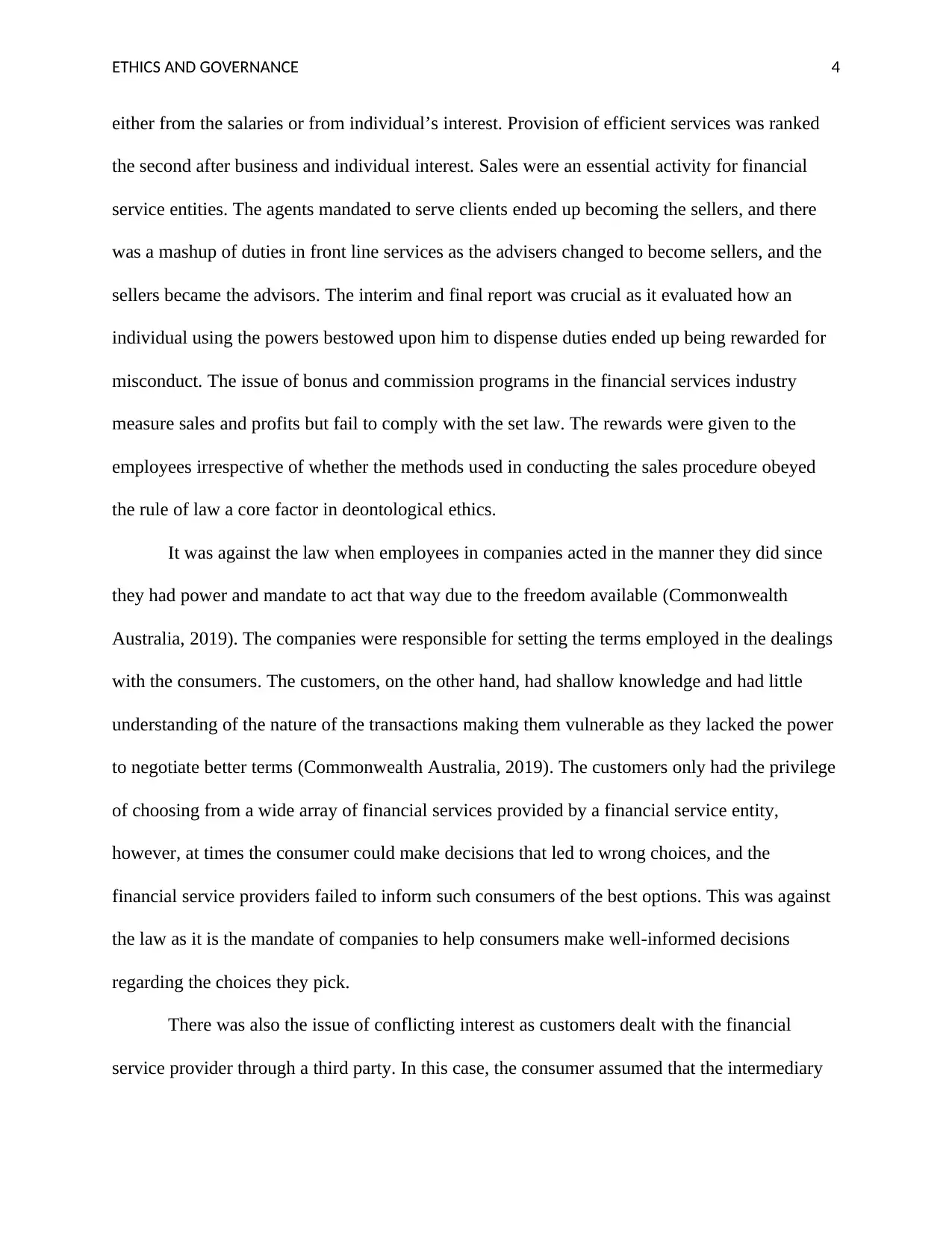
ETHICS AND GOVERNANCE 4
either from the salaries or from individual’s interest. Provision of efficient services was ranked
the second after business and individual interest. Sales were an essential activity for financial
service entities. The agents mandated to serve clients ended up becoming the sellers, and there
was a mashup of duties in front line services as the advisers changed to become sellers, and the
sellers became the advisors. The interim and final report was crucial as it evaluated how an
individual using the powers bestowed upon him to dispense duties ended up being rewarded for
misconduct. The issue of bonus and commission programs in the financial services industry
measure sales and profits but fail to comply with the set law. The rewards were given to the
employees irrespective of whether the methods used in conducting the sales procedure obeyed
the rule of law a core factor in deontological ethics.
It was against the law when employees in companies acted in the manner they did since
they had power and mandate to act that way due to the freedom available (Commonwealth
Australia, 2019). The companies were responsible for setting the terms employed in the dealings
with the consumers. The customers, on the other hand, had shallow knowledge and had little
understanding of the nature of the transactions making them vulnerable as they lacked the power
to negotiate better terms (Commonwealth Australia, 2019). The customers only had the privilege
of choosing from a wide array of financial services provided by a financial service entity,
however, at times the consumer could make decisions that led to wrong choices, and the
financial service providers failed to inform such consumers of the best options. This was against
the law as it is the mandate of companies to help consumers make well-informed decisions
regarding the choices they pick.
There was also the issue of conflicting interest as customers dealt with the financial
service provider through a third party. In this case, the consumer assumed that the intermediary
either from the salaries or from individual’s interest. Provision of efficient services was ranked
the second after business and individual interest. Sales were an essential activity for financial
service entities. The agents mandated to serve clients ended up becoming the sellers, and there
was a mashup of duties in front line services as the advisers changed to become sellers, and the
sellers became the advisors. The interim and final report was crucial as it evaluated how an
individual using the powers bestowed upon him to dispense duties ended up being rewarded for
misconduct. The issue of bonus and commission programs in the financial services industry
measure sales and profits but fail to comply with the set law. The rewards were given to the
employees irrespective of whether the methods used in conducting the sales procedure obeyed
the rule of law a core factor in deontological ethics.
It was against the law when employees in companies acted in the manner they did since
they had power and mandate to act that way due to the freedom available (Commonwealth
Australia, 2019). The companies were responsible for setting the terms employed in the dealings
with the consumers. The customers, on the other hand, had shallow knowledge and had little
understanding of the nature of the transactions making them vulnerable as they lacked the power
to negotiate better terms (Commonwealth Australia, 2019). The customers only had the privilege
of choosing from a wide array of financial services provided by a financial service entity,
however, at times the consumer could make decisions that led to wrong choices, and the
financial service providers failed to inform such consumers of the best options. This was against
the law as it is the mandate of companies to help consumers make well-informed decisions
regarding the choices they pick.
There was also the issue of conflicting interest as customers dealt with the financial
service provider through a third party. In this case, the consumer assumed that the intermediary
Paraphrase This Document
Need a fresh take? Get an instant paraphrase of this document with our AI Paraphraser
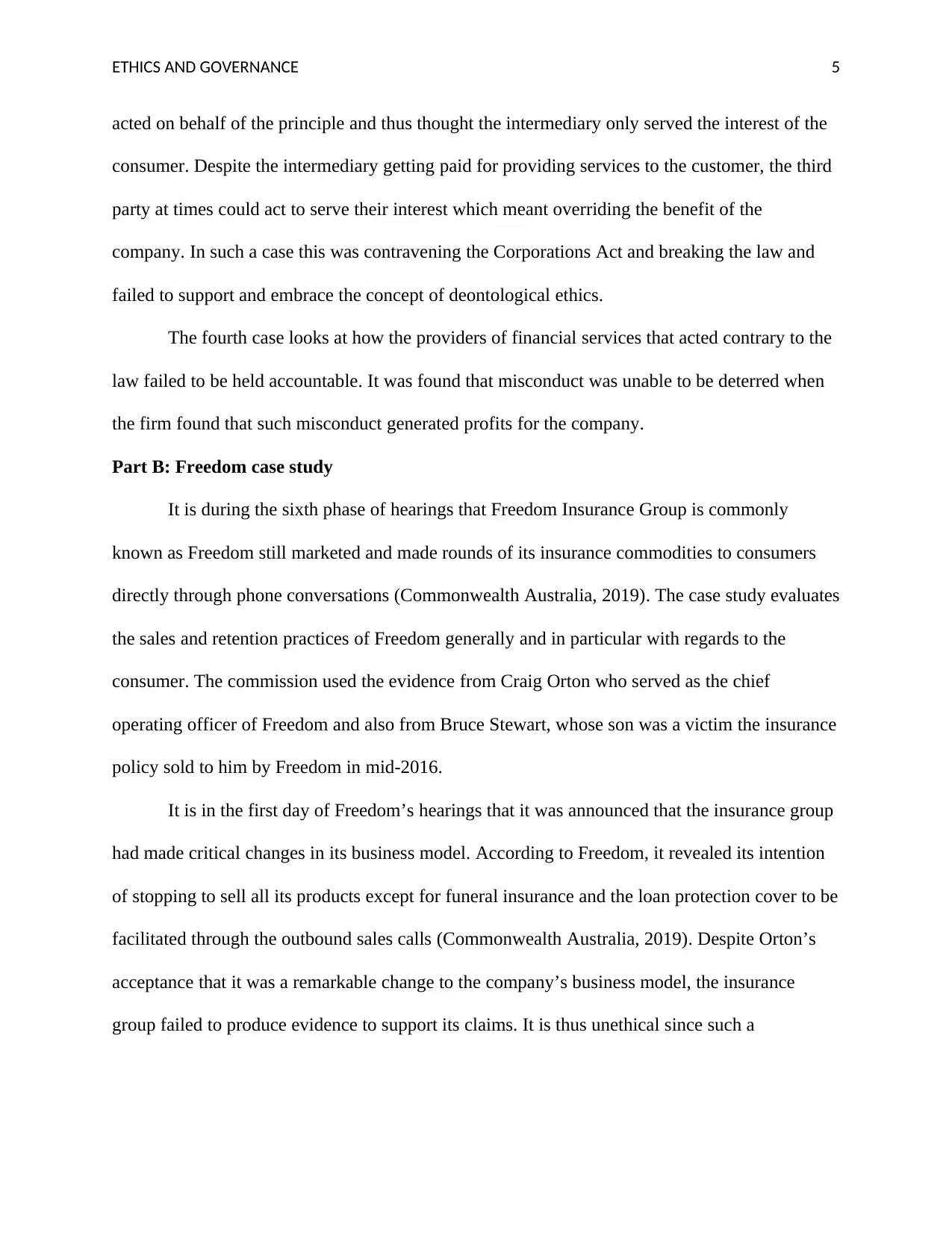
ETHICS AND GOVERNANCE 5
acted on behalf of the principle and thus thought the intermediary only served the interest of the
consumer. Despite the intermediary getting paid for providing services to the customer, the third
party at times could act to serve their interest which meant overriding the benefit of the
company. In such a case this was contravening the Corporations Act and breaking the law and
failed to support and embrace the concept of deontological ethics.
The fourth case looks at how the providers of financial services that acted contrary to the
law failed to be held accountable. It was found that misconduct was unable to be deterred when
the firm found that such misconduct generated profits for the company.
Part B: Freedom case study
It is during the sixth phase of hearings that Freedom Insurance Group is commonly
known as Freedom still marketed and made rounds of its insurance commodities to consumers
directly through phone conversations (Commonwealth Australia, 2019). The case study evaluates
the sales and retention practices of Freedom generally and in particular with regards to the
consumer. The commission used the evidence from Craig Orton who served as the chief
operating officer of Freedom and also from Bruce Stewart, whose son was a victim the insurance
policy sold to him by Freedom in mid-2016.
It is in the first day of Freedom’s hearings that it was announced that the insurance group
had made critical changes in its business model. According to Freedom, it revealed its intention
of stopping to sell all its products except for funeral insurance and the loan protection cover to be
facilitated through the outbound sales calls (Commonwealth Australia, 2019). Despite Orton’s
acceptance that it was a remarkable change to the company’s business model, the insurance
group failed to produce evidence to support its claims. It is thus unethical since such a
acted on behalf of the principle and thus thought the intermediary only served the interest of the
consumer. Despite the intermediary getting paid for providing services to the customer, the third
party at times could act to serve their interest which meant overriding the benefit of the
company. In such a case this was contravening the Corporations Act and breaking the law and
failed to support and embrace the concept of deontological ethics.
The fourth case looks at how the providers of financial services that acted contrary to the
law failed to be held accountable. It was found that misconduct was unable to be deterred when
the firm found that such misconduct generated profits for the company.
Part B: Freedom case study
It is during the sixth phase of hearings that Freedom Insurance Group is commonly
known as Freedom still marketed and made rounds of its insurance commodities to consumers
directly through phone conversations (Commonwealth Australia, 2019). The case study evaluates
the sales and retention practices of Freedom generally and in particular with regards to the
consumer. The commission used the evidence from Craig Orton who served as the chief
operating officer of Freedom and also from Bruce Stewart, whose son was a victim the insurance
policy sold to him by Freedom in mid-2016.
It is in the first day of Freedom’s hearings that it was announced that the insurance group
had made critical changes in its business model. According to Freedom, it revealed its intention
of stopping to sell all its products except for funeral insurance and the loan protection cover to be
facilitated through the outbound sales calls (Commonwealth Australia, 2019). Despite Orton’s
acceptance that it was a remarkable change to the company’s business model, the insurance
group failed to produce evidence to support its claims. It is thus unethical since such a
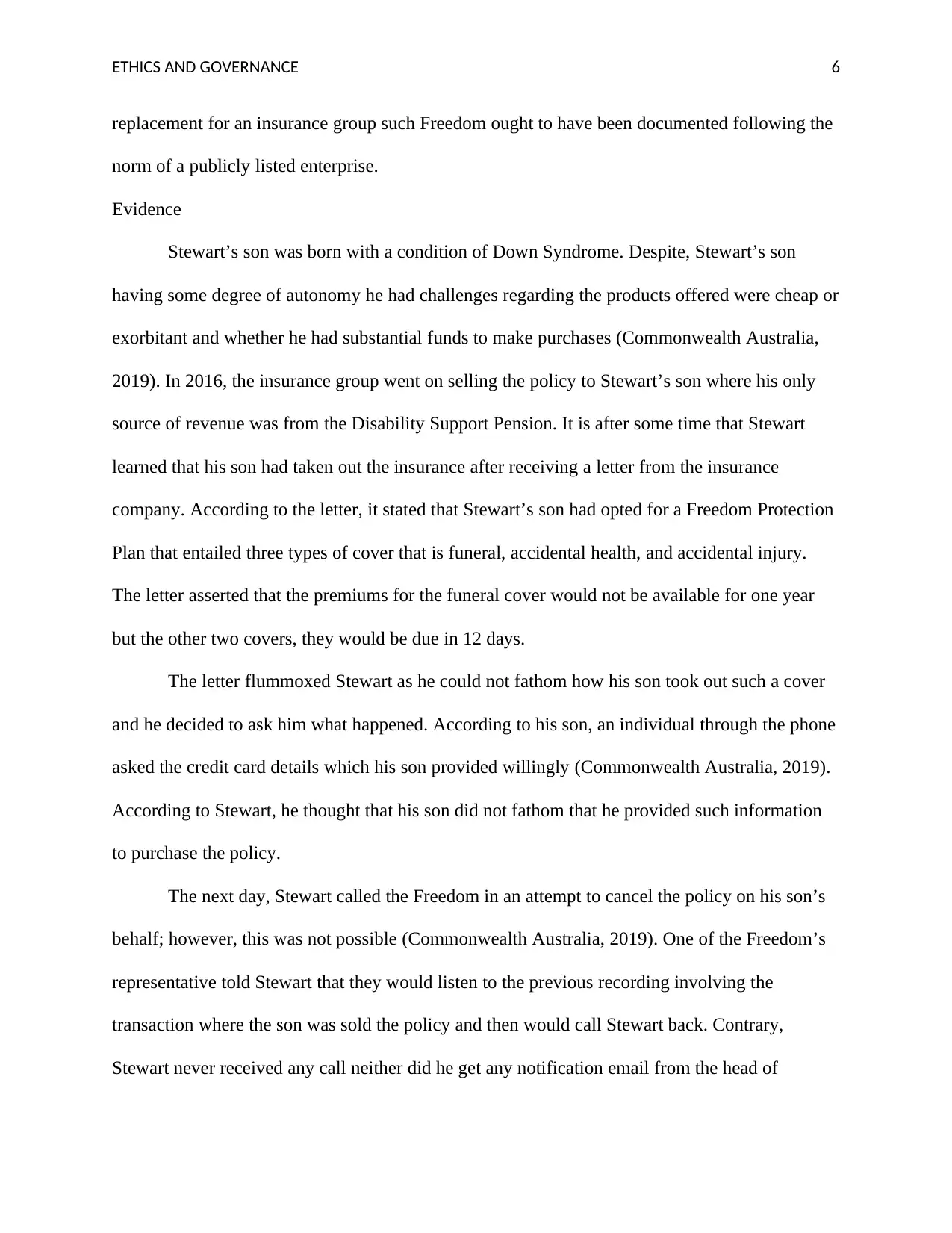
ETHICS AND GOVERNANCE 6
replacement for an insurance group such Freedom ought to have been documented following the
norm of a publicly listed enterprise.
Evidence
Stewart’s son was born with a condition of Down Syndrome. Despite, Stewart’s son
having some degree of autonomy he had challenges regarding the products offered were cheap or
exorbitant and whether he had substantial funds to make purchases (Commonwealth Australia,
2019). In 2016, the insurance group went on selling the policy to Stewart’s son where his only
source of revenue was from the Disability Support Pension. It is after some time that Stewart
learned that his son had taken out the insurance after receiving a letter from the insurance
company. According to the letter, it stated that Stewart’s son had opted for a Freedom Protection
Plan that entailed three types of cover that is funeral, accidental health, and accidental injury.
The letter asserted that the premiums for the funeral cover would not be available for one year
but the other two covers, they would be due in 12 days.
The letter flummoxed Stewart as he could not fathom how his son took out such a cover
and he decided to ask him what happened. According to his son, an individual through the phone
asked the credit card details which his son provided willingly (Commonwealth Australia, 2019).
According to Stewart, he thought that his son did not fathom that he provided such information
to purchase the policy.
The next day, Stewart called the Freedom in an attempt to cancel the policy on his son’s
behalf; however, this was not possible (Commonwealth Australia, 2019). One of the Freedom’s
representative told Stewart that they would listen to the previous recording involving the
transaction where the son was sold the policy and then would call Stewart back. Contrary,
Stewart never received any call neither did he get any notification email from the head of
replacement for an insurance group such Freedom ought to have been documented following the
norm of a publicly listed enterprise.
Evidence
Stewart’s son was born with a condition of Down Syndrome. Despite, Stewart’s son
having some degree of autonomy he had challenges regarding the products offered were cheap or
exorbitant and whether he had substantial funds to make purchases (Commonwealth Australia,
2019). In 2016, the insurance group went on selling the policy to Stewart’s son where his only
source of revenue was from the Disability Support Pension. It is after some time that Stewart
learned that his son had taken out the insurance after receiving a letter from the insurance
company. According to the letter, it stated that Stewart’s son had opted for a Freedom Protection
Plan that entailed three types of cover that is funeral, accidental health, and accidental injury.
The letter asserted that the premiums for the funeral cover would not be available for one year
but the other two covers, they would be due in 12 days.
The letter flummoxed Stewart as he could not fathom how his son took out such a cover
and he decided to ask him what happened. According to his son, an individual through the phone
asked the credit card details which his son provided willingly (Commonwealth Australia, 2019).
According to Stewart, he thought that his son did not fathom that he provided such information
to purchase the policy.
The next day, Stewart called the Freedom in an attempt to cancel the policy on his son’s
behalf; however, this was not possible (Commonwealth Australia, 2019). One of the Freedom’s
representative told Stewart that they would listen to the previous recording involving the
transaction where the son was sold the policy and then would call Stewart back. Contrary,
Stewart never received any call neither did he get any notification email from the head of
⊘ This is a preview!⊘
Do you want full access?
Subscribe today to unlock all pages.

Trusted by 1+ million students worldwide
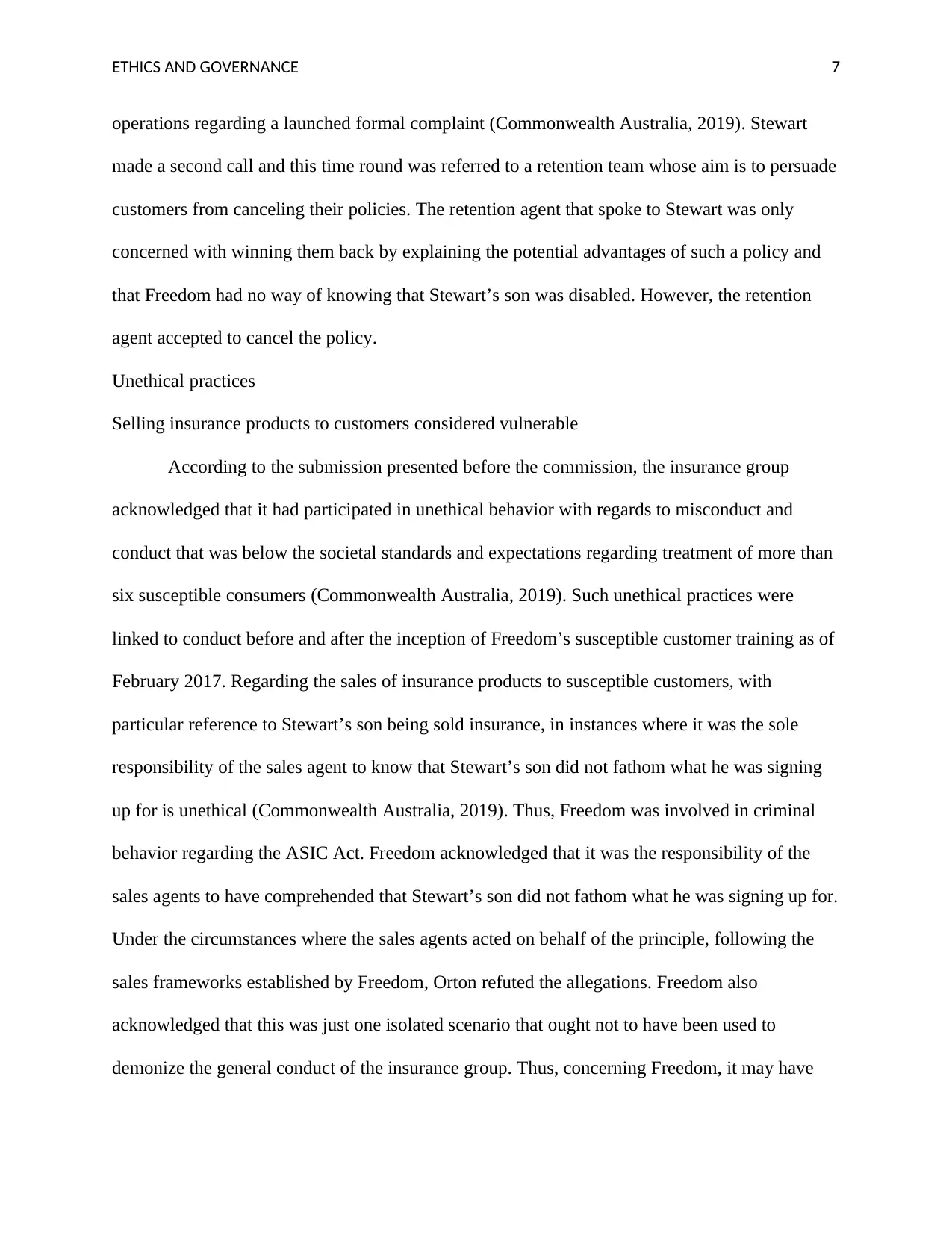
ETHICS AND GOVERNANCE 7
operations regarding a launched formal complaint (Commonwealth Australia, 2019). Stewart
made a second call and this time round was referred to a retention team whose aim is to persuade
customers from canceling their policies. The retention agent that spoke to Stewart was only
concerned with winning them back by explaining the potential advantages of such a policy and
that Freedom had no way of knowing that Stewart’s son was disabled. However, the retention
agent accepted to cancel the policy.
Unethical practices
Selling insurance products to customers considered vulnerable
According to the submission presented before the commission, the insurance group
acknowledged that it had participated in unethical behavior with regards to misconduct and
conduct that was below the societal standards and expectations regarding treatment of more than
six susceptible consumers (Commonwealth Australia, 2019). Such unethical practices were
linked to conduct before and after the inception of Freedom’s susceptible customer training as of
February 2017. Regarding the sales of insurance products to susceptible customers, with
particular reference to Stewart’s son being sold insurance, in instances where it was the sole
responsibility of the sales agent to know that Stewart’s son did not fathom what he was signing
up for is unethical (Commonwealth Australia, 2019). Thus, Freedom was involved in criminal
behavior regarding the ASIC Act. Freedom acknowledged that it was the responsibility of the
sales agents to have comprehended that Stewart’s son did not fathom what he was signing up for.
Under the circumstances where the sales agents acted on behalf of the principle, following the
sales frameworks established by Freedom, Orton refuted the allegations. Freedom also
acknowledged that this was just one isolated scenario that ought not to have been used to
demonize the general conduct of the insurance group. Thus, concerning Freedom, it may have
operations regarding a launched formal complaint (Commonwealth Australia, 2019). Stewart
made a second call and this time round was referred to a retention team whose aim is to persuade
customers from canceling their policies. The retention agent that spoke to Stewart was only
concerned with winning them back by explaining the potential advantages of such a policy and
that Freedom had no way of knowing that Stewart’s son was disabled. However, the retention
agent accepted to cancel the policy.
Unethical practices
Selling insurance products to customers considered vulnerable
According to the submission presented before the commission, the insurance group
acknowledged that it had participated in unethical behavior with regards to misconduct and
conduct that was below the societal standards and expectations regarding treatment of more than
six susceptible consumers (Commonwealth Australia, 2019). Such unethical practices were
linked to conduct before and after the inception of Freedom’s susceptible customer training as of
February 2017. Regarding the sales of insurance products to susceptible customers, with
particular reference to Stewart’s son being sold insurance, in instances where it was the sole
responsibility of the sales agent to know that Stewart’s son did not fathom what he was signing
up for is unethical (Commonwealth Australia, 2019). Thus, Freedom was involved in criminal
behavior regarding the ASIC Act. Freedom acknowledged that it was the responsibility of the
sales agents to have comprehended that Stewart’s son did not fathom what he was signing up for.
Under the circumstances where the sales agents acted on behalf of the principle, following the
sales frameworks established by Freedom, Orton refuted the allegations. Freedom also
acknowledged that this was just one isolated scenario that ought not to have been used to
demonize the general conduct of the insurance group. Thus, concerning Freedom, it may have
Paraphrase This Document
Need a fresh take? Get an instant paraphrase of this document with our AI Paraphraser
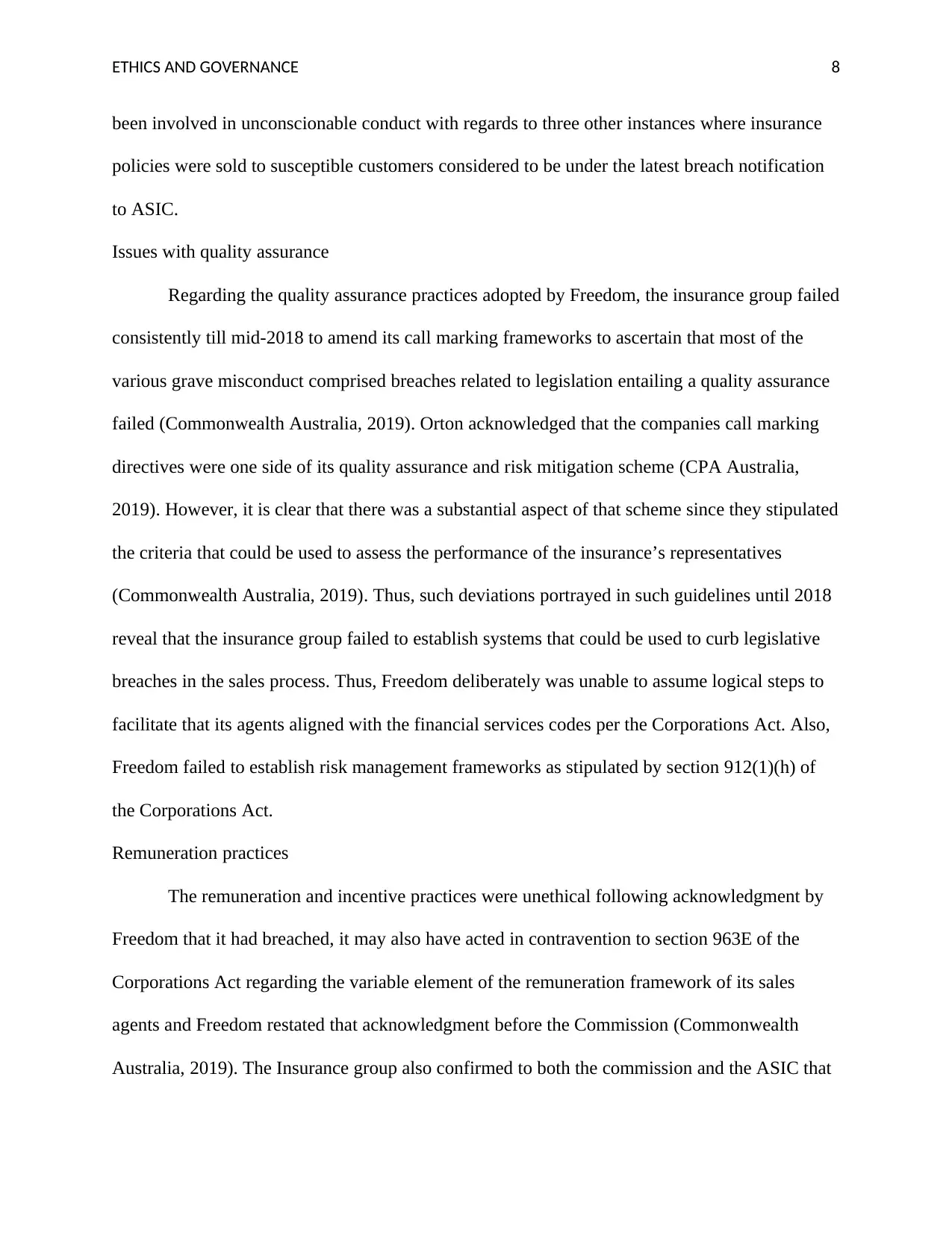
ETHICS AND GOVERNANCE 8
been involved in unconscionable conduct with regards to three other instances where insurance
policies were sold to susceptible customers considered to be under the latest breach notification
to ASIC.
Issues with quality assurance
Regarding the quality assurance practices adopted by Freedom, the insurance group failed
consistently till mid-2018 to amend its call marking frameworks to ascertain that most of the
various grave misconduct comprised breaches related to legislation entailing a quality assurance
failed (Commonwealth Australia, 2019). Orton acknowledged that the companies call marking
directives were one side of its quality assurance and risk mitigation scheme (CPA Australia,
2019). However, it is clear that there was a substantial aspect of that scheme since they stipulated
the criteria that could be used to assess the performance of the insurance’s representatives
(Commonwealth Australia, 2019). Thus, such deviations portrayed in such guidelines until 2018
reveal that the insurance group failed to establish systems that could be used to curb legislative
breaches in the sales process. Thus, Freedom deliberately was unable to assume logical steps to
facilitate that its agents aligned with the financial services codes per the Corporations Act. Also,
Freedom failed to establish risk management frameworks as stipulated by section 912(1)(h) of
the Corporations Act.
Remuneration practices
The remuneration and incentive practices were unethical following acknowledgment by
Freedom that it had breached, it may also have acted in contravention to section 963E of the
Corporations Act regarding the variable element of the remuneration framework of its sales
agents and Freedom restated that acknowledgment before the Commission (Commonwealth
Australia, 2019). The Insurance group also confirmed to both the commission and the ASIC that
been involved in unconscionable conduct with regards to three other instances where insurance
policies were sold to susceptible customers considered to be under the latest breach notification
to ASIC.
Issues with quality assurance
Regarding the quality assurance practices adopted by Freedom, the insurance group failed
consistently till mid-2018 to amend its call marking frameworks to ascertain that most of the
various grave misconduct comprised breaches related to legislation entailing a quality assurance
failed (Commonwealth Australia, 2019). Orton acknowledged that the companies call marking
directives were one side of its quality assurance and risk mitigation scheme (CPA Australia,
2019). However, it is clear that there was a substantial aspect of that scheme since they stipulated
the criteria that could be used to assess the performance of the insurance’s representatives
(Commonwealth Australia, 2019). Thus, such deviations portrayed in such guidelines until 2018
reveal that the insurance group failed to establish systems that could be used to curb legislative
breaches in the sales process. Thus, Freedom deliberately was unable to assume logical steps to
facilitate that its agents aligned with the financial services codes per the Corporations Act. Also,
Freedom failed to establish risk management frameworks as stipulated by section 912(1)(h) of
the Corporations Act.
Remuneration practices
The remuneration and incentive practices were unethical following acknowledgment by
Freedom that it had breached, it may also have acted in contravention to section 963E of the
Corporations Act regarding the variable element of the remuneration framework of its sales
agents and Freedom restated that acknowledgment before the Commission (Commonwealth
Australia, 2019). The Insurance group also confirmed to both the commission and the ASIC that
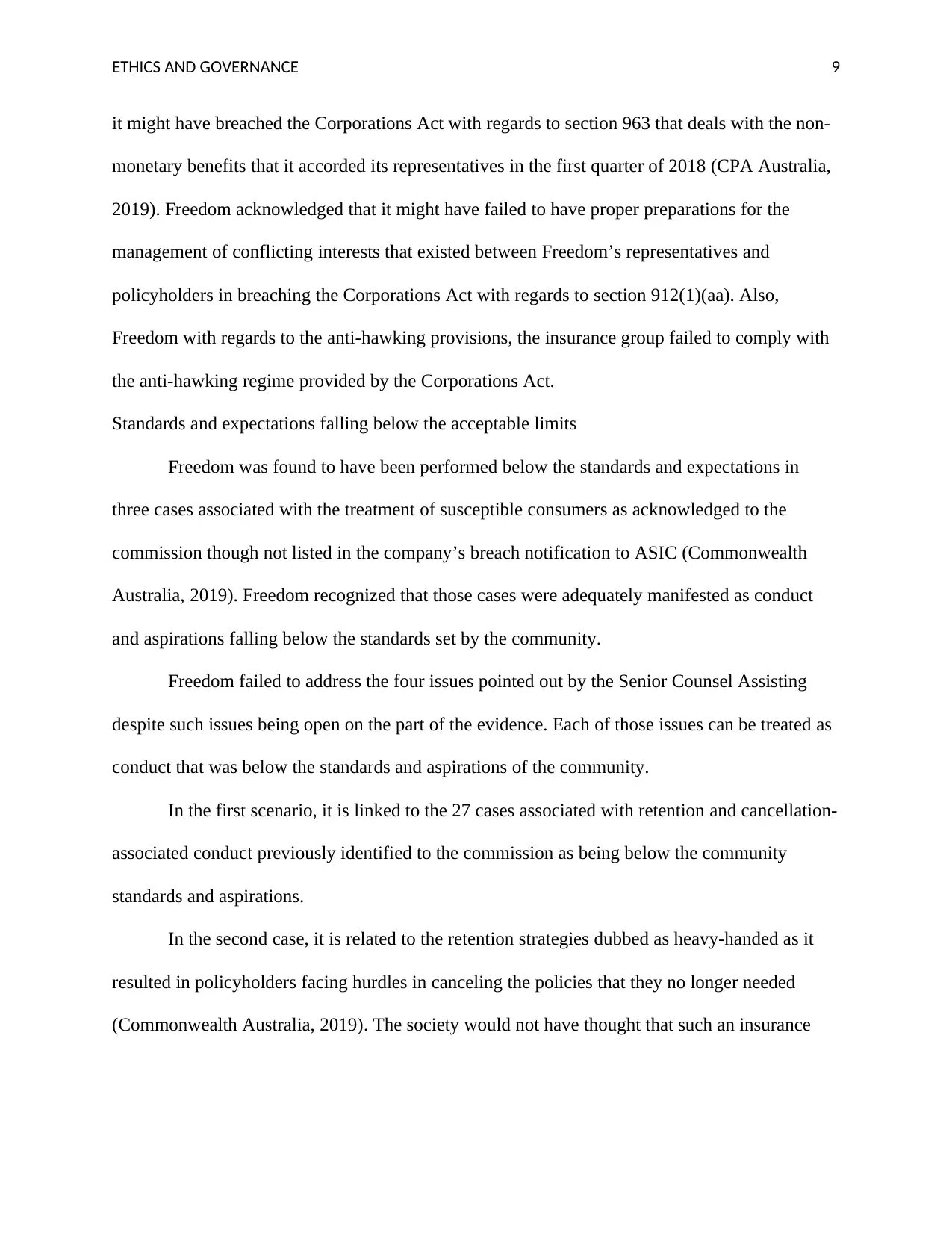
ETHICS AND GOVERNANCE 9
it might have breached the Corporations Act with regards to section 963 that deals with the non-
monetary benefits that it accorded its representatives in the first quarter of 2018 (CPA Australia,
2019). Freedom acknowledged that it might have failed to have proper preparations for the
management of conflicting interests that existed between Freedom’s representatives and
policyholders in breaching the Corporations Act with regards to section 912(1)(aa). Also,
Freedom with regards to the anti-hawking provisions, the insurance group failed to comply with
the anti-hawking regime provided by the Corporations Act.
Standards and expectations falling below the acceptable limits
Freedom was found to have been performed below the standards and expectations in
three cases associated with the treatment of susceptible consumers as acknowledged to the
commission though not listed in the company’s breach notification to ASIC (Commonwealth
Australia, 2019). Freedom recognized that those cases were adequately manifested as conduct
and aspirations falling below the standards set by the community.
Freedom failed to address the four issues pointed out by the Senior Counsel Assisting
despite such issues being open on the part of the evidence. Each of those issues can be treated as
conduct that was below the standards and aspirations of the community.
In the first scenario, it is linked to the 27 cases associated with retention and cancellation-
associated conduct previously identified to the commission as being below the community
standards and aspirations.
In the second case, it is related to the retention strategies dubbed as heavy-handed as it
resulted in policyholders facing hurdles in canceling the policies that they no longer needed
(Commonwealth Australia, 2019). The society would not have thought that such an insurance
it might have breached the Corporations Act with regards to section 963 that deals with the non-
monetary benefits that it accorded its representatives in the first quarter of 2018 (CPA Australia,
2019). Freedom acknowledged that it might have failed to have proper preparations for the
management of conflicting interests that existed between Freedom’s representatives and
policyholders in breaching the Corporations Act with regards to section 912(1)(aa). Also,
Freedom with regards to the anti-hawking provisions, the insurance group failed to comply with
the anti-hawking regime provided by the Corporations Act.
Standards and expectations falling below the acceptable limits
Freedom was found to have been performed below the standards and expectations in
three cases associated with the treatment of susceptible consumers as acknowledged to the
commission though not listed in the company’s breach notification to ASIC (Commonwealth
Australia, 2019). Freedom recognized that those cases were adequately manifested as conduct
and aspirations falling below the standards set by the community.
Freedom failed to address the four issues pointed out by the Senior Counsel Assisting
despite such issues being open on the part of the evidence. Each of those issues can be treated as
conduct that was below the standards and aspirations of the community.
In the first scenario, it is linked to the 27 cases associated with retention and cancellation-
associated conduct previously identified to the commission as being below the community
standards and aspirations.
In the second case, it is related to the retention strategies dubbed as heavy-handed as it
resulted in policyholders facing hurdles in canceling the policies that they no longer needed
(Commonwealth Australia, 2019). The society would not have thought that such an insurance
⊘ This is a preview!⊘
Do you want full access?
Subscribe today to unlock all pages.

Trusted by 1+ million students worldwide
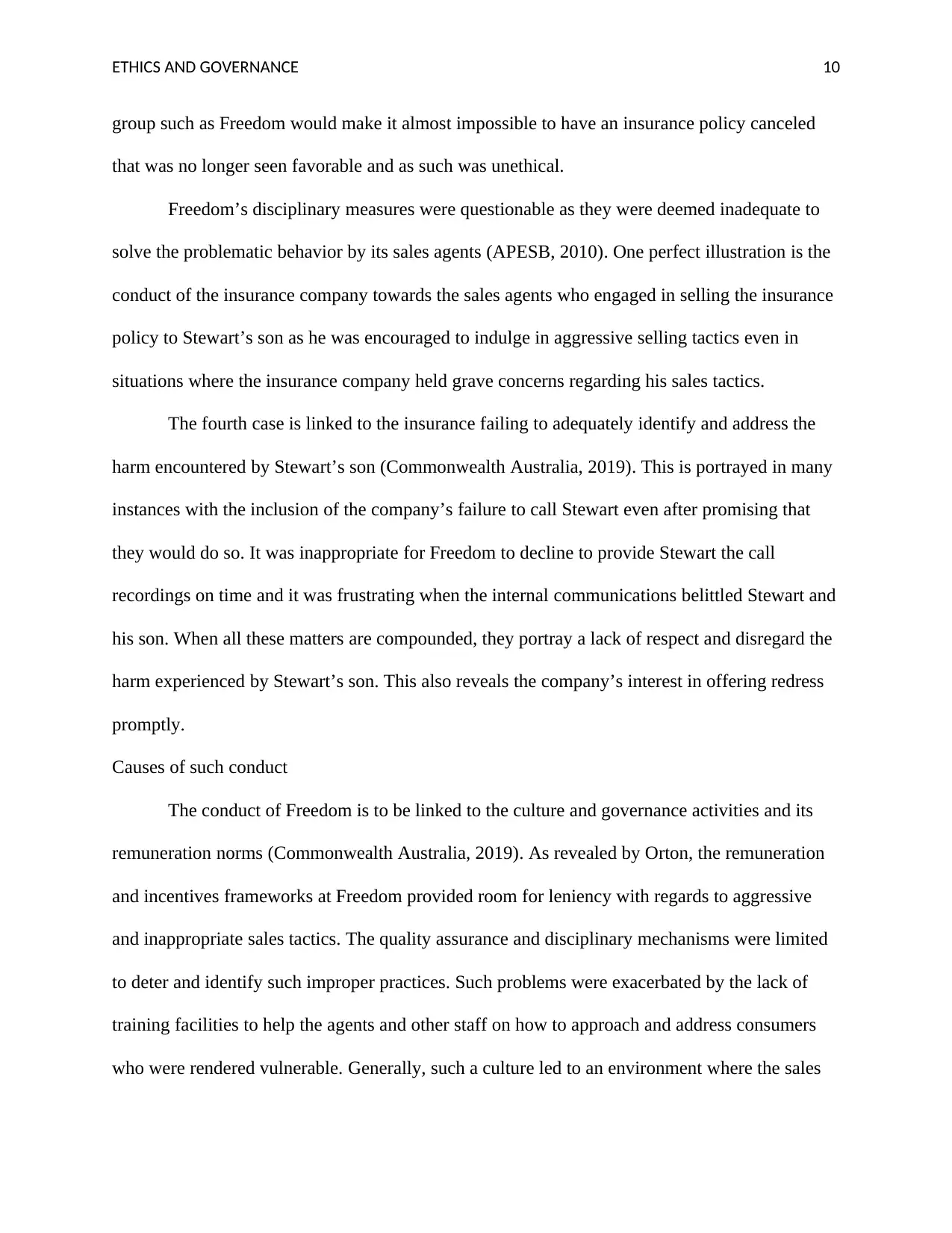
ETHICS AND GOVERNANCE 10
group such as Freedom would make it almost impossible to have an insurance policy canceled
that was no longer seen favorable and as such was unethical.
Freedom’s disciplinary measures were questionable as they were deemed inadequate to
solve the problematic behavior by its sales agents (APESB, 2010). One perfect illustration is the
conduct of the insurance company towards the sales agents who engaged in selling the insurance
policy to Stewart’s son as he was encouraged to indulge in aggressive selling tactics even in
situations where the insurance company held grave concerns regarding his sales tactics.
The fourth case is linked to the insurance failing to adequately identify and address the
harm encountered by Stewart’s son (Commonwealth Australia, 2019). This is portrayed in many
instances with the inclusion of the company’s failure to call Stewart even after promising that
they would do so. It was inappropriate for Freedom to decline to provide Stewart the call
recordings on time and it was frustrating when the internal communications belittled Stewart and
his son. When all these matters are compounded, they portray a lack of respect and disregard the
harm experienced by Stewart’s son. This also reveals the company’s interest in offering redress
promptly.
Causes of such conduct
The conduct of Freedom is to be linked to the culture and governance activities and its
remuneration norms (Commonwealth Australia, 2019). As revealed by Orton, the remuneration
and incentives frameworks at Freedom provided room for leniency with regards to aggressive
and inappropriate sales tactics. The quality assurance and disciplinary mechanisms were limited
to deter and identify such improper practices. Such problems were exacerbated by the lack of
training facilities to help the agents and other staff on how to approach and address consumers
who were rendered vulnerable. Generally, such a culture led to an environment where the sales
group such as Freedom would make it almost impossible to have an insurance policy canceled
that was no longer seen favorable and as such was unethical.
Freedom’s disciplinary measures were questionable as they were deemed inadequate to
solve the problematic behavior by its sales agents (APESB, 2010). One perfect illustration is the
conduct of the insurance company towards the sales agents who engaged in selling the insurance
policy to Stewart’s son as he was encouraged to indulge in aggressive selling tactics even in
situations where the insurance company held grave concerns regarding his sales tactics.
The fourth case is linked to the insurance failing to adequately identify and address the
harm encountered by Stewart’s son (Commonwealth Australia, 2019). This is portrayed in many
instances with the inclusion of the company’s failure to call Stewart even after promising that
they would do so. It was inappropriate for Freedom to decline to provide Stewart the call
recordings on time and it was frustrating when the internal communications belittled Stewart and
his son. When all these matters are compounded, they portray a lack of respect and disregard the
harm experienced by Stewart’s son. This also reveals the company’s interest in offering redress
promptly.
Causes of such conduct
The conduct of Freedom is to be linked to the culture and governance activities and its
remuneration norms (Commonwealth Australia, 2019). As revealed by Orton, the remuneration
and incentives frameworks at Freedom provided room for leniency with regards to aggressive
and inappropriate sales tactics. The quality assurance and disciplinary mechanisms were limited
to deter and identify such improper practices. Such problems were exacerbated by the lack of
training facilities to help the agents and other staff on how to approach and address consumers
who were rendered vulnerable. Generally, such a culture led to an environment where the sales
Paraphrase This Document
Need a fresh take? Get an instant paraphrase of this document with our AI Paraphraser
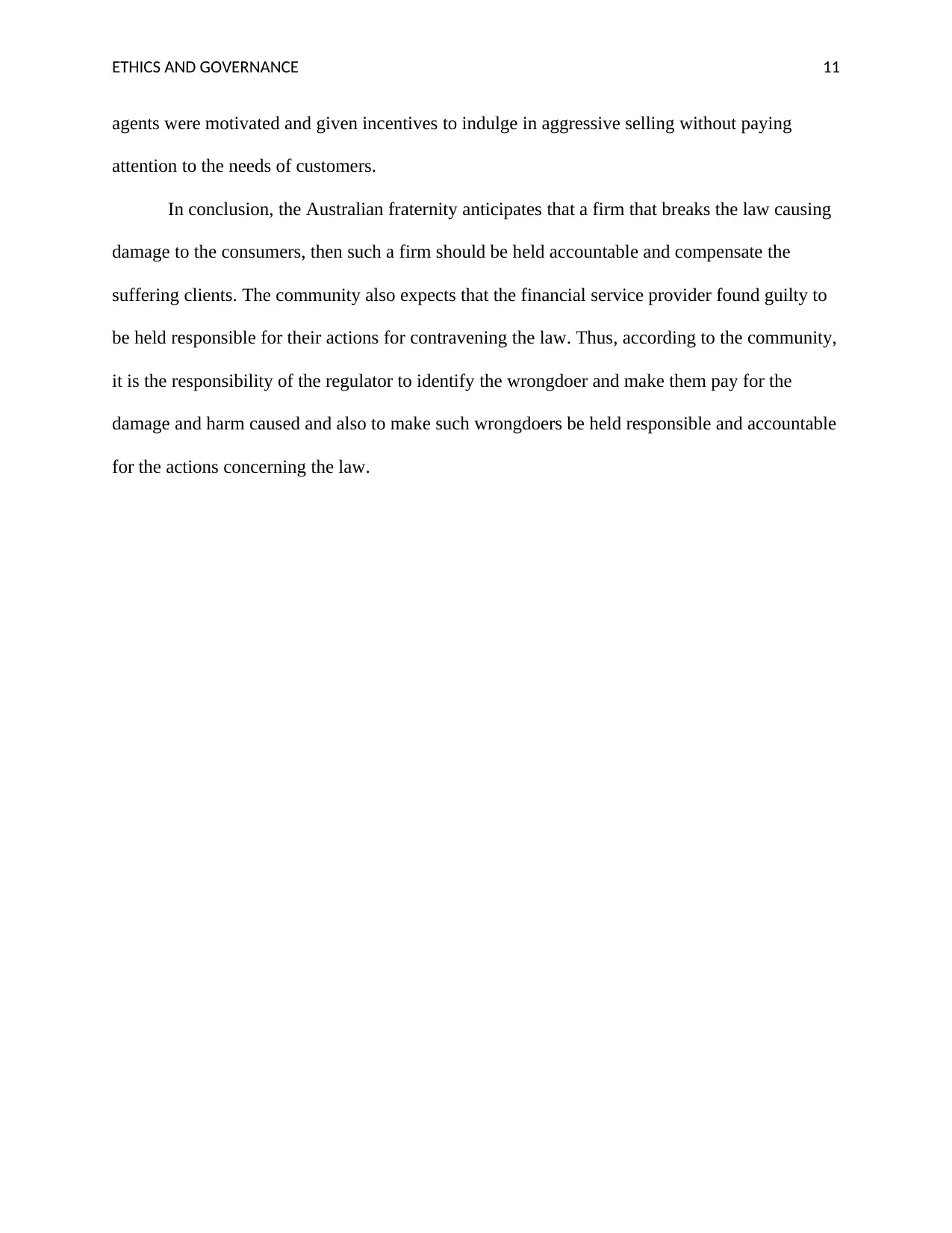
ETHICS AND GOVERNANCE 11
agents were motivated and given incentives to indulge in aggressive selling without paying
attention to the needs of customers.
In conclusion, the Australian fraternity anticipates that a firm that breaks the law causing
damage to the consumers, then such a firm should be held accountable and compensate the
suffering clients. The community also expects that the financial service provider found guilty to
be held responsible for their actions for contravening the law. Thus, according to the community,
it is the responsibility of the regulator to identify the wrongdoer and make them pay for the
damage and harm caused and also to make such wrongdoers be held responsible and accountable
for the actions concerning the law.
agents were motivated and given incentives to indulge in aggressive selling without paying
attention to the needs of customers.
In conclusion, the Australian fraternity anticipates that a firm that breaks the law causing
damage to the consumers, then such a firm should be held accountable and compensate the
suffering clients. The community also expects that the financial service provider found guilty to
be held responsible for their actions for contravening the law. Thus, according to the community,
it is the responsibility of the regulator to identify the wrongdoer and make them pay for the
damage and harm caused and also to make such wrongdoers be held responsible and accountable
for the actions concerning the law.
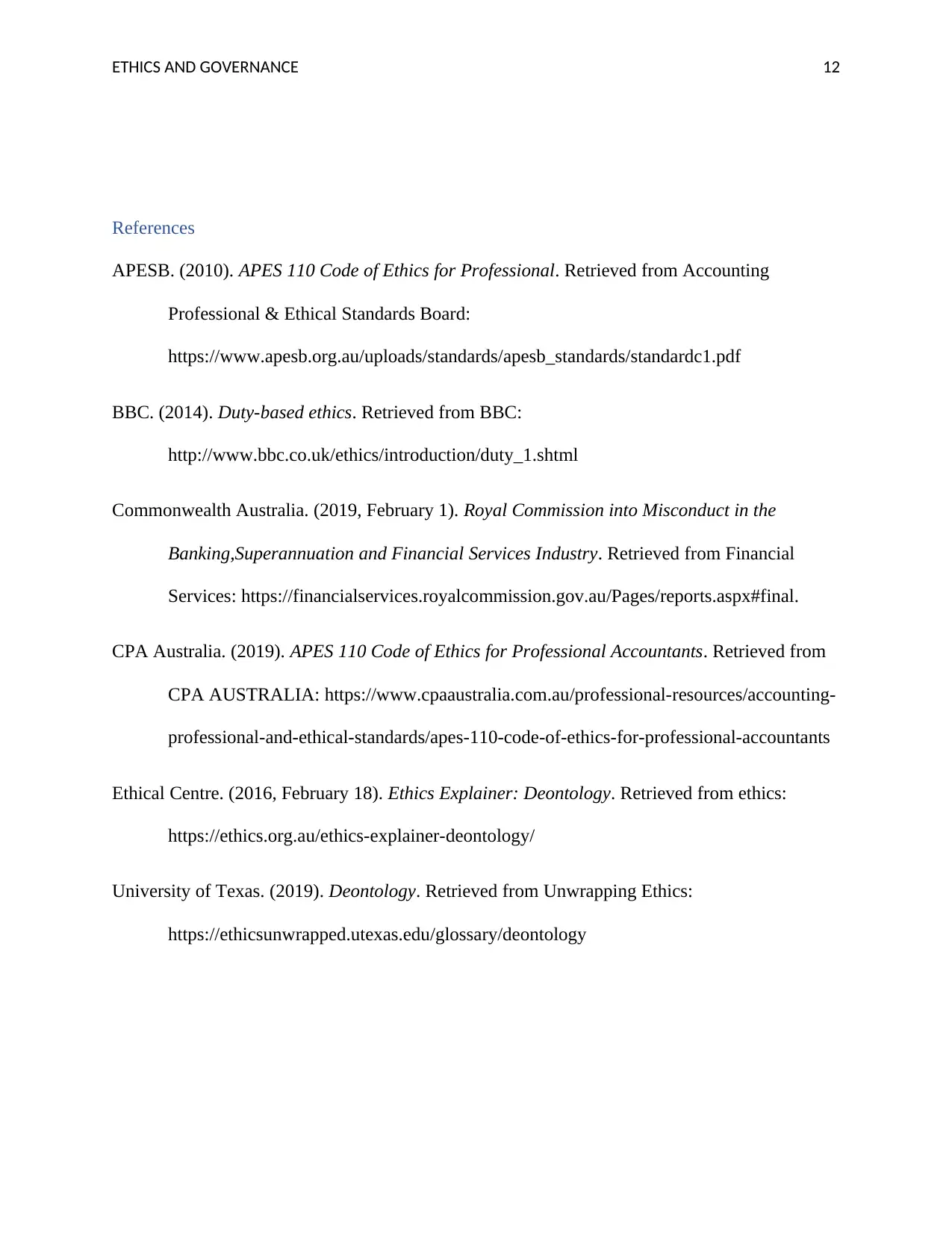
ETHICS AND GOVERNANCE 12
References
APESB. (2010). APES 110 Code of Ethics for Professional. Retrieved from Accounting
Professional & Ethical Standards Board:
https://www.apesb.org.au/uploads/standards/apesb_standards/standardc1.pdf
BBC. (2014). Duty-based ethics. Retrieved from BBC:
http://www.bbc.co.uk/ethics/introduction/duty_1.shtml
Commonwealth Australia. (2019, February 1). Royal Commission into Misconduct in the
Banking,Superannuation and Financial Services Industry. Retrieved from Financial
Services: https://financialservices.royalcommission.gov.au/Pages/reports.aspx#final.
CPA Australia. (2019). APES 110 Code of Ethics for Professional Accountants. Retrieved from
CPA AUSTRALIA: https://www.cpaaustralia.com.au/professional-resources/accounting-
professional-and-ethical-standards/apes-110-code-of-ethics-for-professional-accountants
Ethical Centre. (2016, February 18). Ethics Explainer: Deontology. Retrieved from ethics:
https://ethics.org.au/ethics-explainer-deontology/
University of Texas. (2019). Deontology. Retrieved from Unwrapping Ethics:
https://ethicsunwrapped.utexas.edu/glossary/deontology
References
APESB. (2010). APES 110 Code of Ethics for Professional. Retrieved from Accounting
Professional & Ethical Standards Board:
https://www.apesb.org.au/uploads/standards/apesb_standards/standardc1.pdf
BBC. (2014). Duty-based ethics. Retrieved from BBC:
http://www.bbc.co.uk/ethics/introduction/duty_1.shtml
Commonwealth Australia. (2019, February 1). Royal Commission into Misconduct in the
Banking,Superannuation and Financial Services Industry. Retrieved from Financial
Services: https://financialservices.royalcommission.gov.au/Pages/reports.aspx#final.
CPA Australia. (2019). APES 110 Code of Ethics for Professional Accountants. Retrieved from
CPA AUSTRALIA: https://www.cpaaustralia.com.au/professional-resources/accounting-
professional-and-ethical-standards/apes-110-code-of-ethics-for-professional-accountants
Ethical Centre. (2016, February 18). Ethics Explainer: Deontology. Retrieved from ethics:
https://ethics.org.au/ethics-explainer-deontology/
University of Texas. (2019). Deontology. Retrieved from Unwrapping Ethics:
https://ethicsunwrapped.utexas.edu/glossary/deontology
⊘ This is a preview!⊘
Do you want full access?
Subscribe today to unlock all pages.

Trusted by 1+ million students worldwide
1 out of 12
Related Documents
Your All-in-One AI-Powered Toolkit for Academic Success.
+13062052269
info@desklib.com
Available 24*7 on WhatsApp / Email
![[object Object]](/_next/static/media/star-bottom.7253800d.svg)
Unlock your academic potential
Copyright © 2020–2026 A2Z Services. All Rights Reserved. Developed and managed by ZUCOL.





